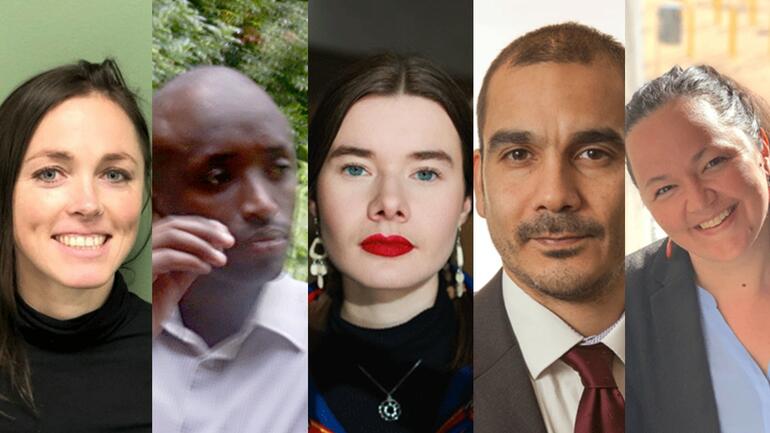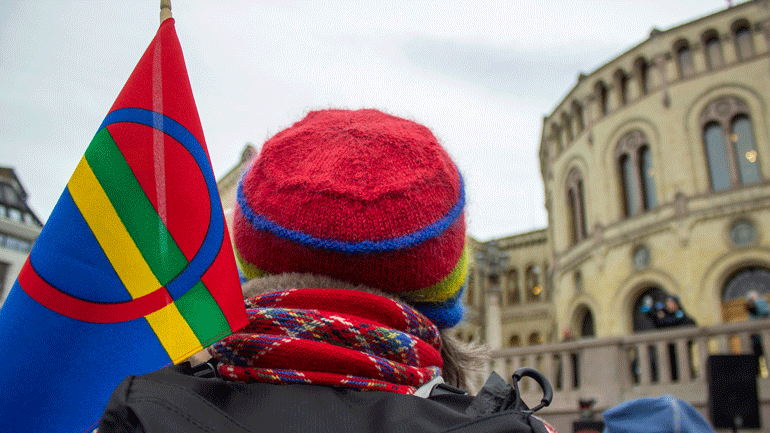The USN research groups Human Rights and Diversities and Social Studies Education (SAMD) are pleased to invite you to a panel conversation that focus particularly on the implications from the Fosen case for education and academia.
Background: the Fosen case
Thursday February 23rd of 2023, a group of young Sámi and environmental activists entered the Norwegian Ministry of Oil and Energy in Oslo, protesting the building of wind turbines in the South Sámi area at Fovsen (Fosen) in Trøndelag county.
This date marked 500 days passed since the Norwegian Supreme Court concluded that the wind power plants placed on the winter pastures of the Fovsen Njaarke reindeer herders was a violation of article 27 of the International Convention on Civil and Political Rights (ICCPR). 500 days after the ruling, the Norwegian state had taken no action to stop the ongoing violation of the Human rights of the indigenous Sámi.
The Fosen case represents one among several such cases of conflict between state interests and the rights and interests of the Sámi. The project is linked to the Norwegian state’s “green transition” policies and commitments to sustainability. However, the concept “Green colonialism” has been used to challenge such hegemonic climate change policies, and in particular the expansion of wind industry in Sápmi.
This conflict also mirrors similar processes internationally. A global Indigenous Peoples’ movement question the “green growth” premise and demand a rights-based approach to climate justice.
- What are the responsibilities of education, from early childhood throughout higher education, in ensuring and protecting the rights and recognition of the Sámi?
- How can education contribute to an upcoming generation of citizens better equipped to manage such conflicts and enabling sustainable futures?
- What are the potential contributions from academia and higher education to the ongoing process of reconciliation between the Sámi and the Norwegian state?
The event will feature short introductions from panel participants speaking from different contexts, such as activism, education, human rights, and indigenous knowledges, followed by a conversation. The audience will be given opportunity to ask questions.
The event is in English and open to anyone interested but especially aimed at faculty staff and students associated with our teacher education and masters` program in Human rights and Multiculturalism.
Contributors to the panel conversation:

- Ida Helene Benonisen, activist, artist and journalist. Benonisen participated as an activist in the protest occupation of the Norwegian Ministry of Oil and Energy in February/March of 2023.
- Hadi Strømmen Lile, Professor of Law, Østfold University College. Lile is an expert in Human Rights, and has done extensive work on Human rights education and indigenous rights in education.
- Susanne Normann, Researcher at the Nordland Research Institute. Normanns` research includes studies of implementation of climate policies in indigenous areas of Brazil and Norway/South Sápmi. Normann has worked extensively with issues of human rights and indigenous perspectives in Latin-America.
- Kristin Gregers Eriksen, Associate professor in Social studies education, University of South-Easter Norway. Eriksen specializes in anti-racist, decolonial and indigenous (Sámi) perspectives in education.
- Chair: Bernard Ntahiraja, Associate Professor at the University of South Eastern Norway: Human Rights Law and Criminal Law.
The event is co-sponsored by the research groups Human Rights and Diversities and Social Studies Education (SAMD), at the Department of Culture, Religion and Social studies, Faculty of Humanities, Sports and Educational Science, USN.
